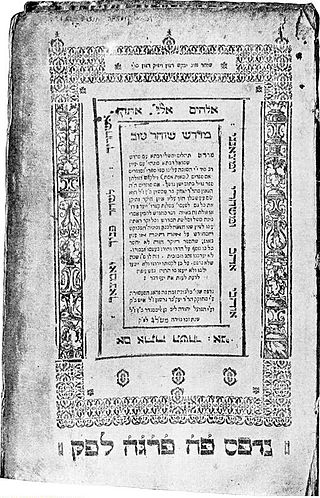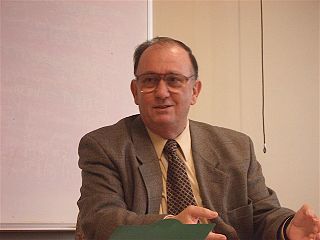Related Research Articles
The Essenes were a mystic Jewish sect during the Second Temple period that flourished from the 2nd century BCE to the 1st century CE.

Midrash is expansive Jewish Biblical exegesis using a rabbinic mode of interpretation prominent in the Talmud. The word itself means "textual interpretation", "study", or "exegesis", derived from the root verb darash (דָּרַשׁ), which means "resort to, seek, seek with care, enquire, require", forms of which appear frequently in the Hebrew Bible.

The Dead Sea Scrolls, also called the Qumran Caves Scrolls, are a set of ancient Jewish manuscripts from the Second Temple period. They were discovered over a period of 10 years, between 1946 and 1956, at the Qumran Caves near Ein Feshkha in the West Bank, on the northern shore of the Dead Sea. Dating from the 3rd century BCE to the 1st century CE, the Dead Sea Scrolls are considered to be a keystone in the history of archaeology with great historical, religious, and linguistic significance because they include the oldest surviving manuscripts of entire books later included in the biblical canons, along with extra-biblical and deuterocanonical manuscripts that preserve evidence of the diversity of religious thought in late Second Temple Judaism. At the same time, they cast new light on the emergence of Christianity and of Rabbinic Judaism. Almost all of the 15,000 scrolls and scroll fragments are held in the Shrine of the Book at the Israel Museum, located in the city of Jerusalem. The Israeli government's custody of the Dead Sea Scrolls is disputed by Jordan and the Palestinian Authority on territorial, legal, and humanitarian grounds — they were mostly discovered following the Jordanian annexation of the West Bank and were acquired by Israel after Jordan lost the 1967 Arab–Israeli War — whilst Israel's claims are primarily based on historical and religious grounds, given their significance in Jewish history and in the heritage of Judaism.

The Shepherd of Hermas, sometimes just called The Shepherd, is a Christian literary work of the late first half of the second century, considered a valuable book by many Christians, and considered canonical scripture by some of the early Church fathers such as Irenaeus. The Shepherd was popular amongst Christians in the 2nd, 3rd, and 4th centuries. It is found in the Codex Sinaiticus.

The Book of Giants is an apocryphal Jewish book which expands upon the Genesis narrative of the Hebrew Bible, in a similar manner to the Book of Enoch. Together with this latter work, the Book of Giants "stands as an attempt to explain how it was that wickedness had become so widespread and muscular before the flood; in so doing, it also supplies the reason why God was more than justified in sending that flood." The text's composition has been dated to before the 2nd century BC.

Lawrence Harvey Schiffman is a professor at New York University ; he was formerly Vice-Provost of Undergraduate Education at Yeshiva University and Professor of Jewish Studies. He had previously been Chair of New York University's Skirball Department of Hebrew and Judaic Studies and served as the Ethel and Irvin A. Edelman Professor in Hebrew and Judaic Studies at New York University (NYU). He is currently the Judge Abraham Lieberman Professor of Hebrew and Judaic Studies at New York University and Director of the Global Institute for Advanced Research in Jewish Studies. He is a specialist in the Dead Sea Scrolls, Judaism in Late Antiquity, the history of Jewish law, and Talmudic literature.

Géza Vermes, was a British academic, Biblical scholar, and Judaist of Jewish–Hungarian descent—one who also served as a Roman Catholic priest in his youth—and scholar specialized in the field of the history of religion, particularly ancient Judaism and early Christianity. He is best known for his complete translation of the Dead Sea Scrolls into English; his research focused on the Dead Sea Scrolls and other Ancient Hebrew writings in Aramaic such as the Targumim, and on the life and religion of Jesus. Vermes was one of the most important voices in contemporary Jesus research, and he has been described as the greatest Jesus scholar of his time. Vermes' written work on Jesus focuses principally on the Jewishness of the historical Jesus, as seen in the broader context of the narrative scope of Jewish history and theology, while questioning and challenging the basis of the Christian doctrine on Jesus.

John Strugnell became, at 23, the youngest member of the team of scholars led by Roland de Vaux, formed in 1954 to edit the Dead Sea Scrolls in Jerusalem. He was studying Oriental languages at Jesus College, Oxford when Sir Godfrey Rolles Driver, a lecturer in Semitic philology, nominated him to join the Scrolls editorial team.
Jonathan G Campbell was a Senior Lecturer in Biblical Studies & Early Judaism in the Department of Theology and Religious Studies at the University of Bristol in Bristol, United Kingdom. He retired in 2017.
Discoveries in the Judaean Desert (DJD) is the official 40-volume publication that serves as the editio princeps for the Dead Sea Scrolls. It is published by Oxford University Press.
The Enoch Seminar is an academic group of international specialists in Second Temple Judaism and the origins of Christianity who share information about their work in the field and biennially meet to discuss topics of common interest. The group is supported by the Department of Near Eastern Studies of the University of Michigan and the Michigan Center for Early Christian Studies, the group gathers about 200 university professors from more than fifteen countries.
Loren T. Stuckenbruck is an historian of early Christianity and Second Temple Judaism, currently professor of New Testament at the University of Munich, in Germany. His work has exerted a significant impact on the field.
4QInstruction,, also known as Sapiential Work A or Secret of the Way Things Are, is a Hebrew text among the Dead Sea Scrolls classified as wisdom literature. It is authored by a spiritual expert, directed towards a beginner. The author addresses how to deal with business and money issues in a godly manner, public affairs, leadership, marriage, children, and family, and how to live life righteously among secular society. There is some consensus that it dates to the third century BCE.

Michael Edward Stone is a professor emeritus of Armenian Studies and of Comparative Religion at the Hebrew University of Jerusalem. His research deals with Armenian studies and with Jewish literature and thought of the Second Temple period. He is also a published poet.
Eva Mroczek is a North American scholar of ancient Judaism, in particular the texts of the Hebrew Bible, Dead Sea Scrolls, and Apocrypha, and Jewish readers' and writers' engagement with these texts. She is the author of The Literary Imagination in Jewish Antiquity (2016).
Carol Ann Newsom is an American biblical scholar, historian of ancient Judaism, and literary critic. She is the Charles Howard Candler Professor Emerita of Old Testament at the Candler School of Theology and a former senior fellow at the Center for the Study of Law and Religion at Emory University. She is a leading expert on the Dead Sea Scrolls, Wisdom literature, and the Book of Daniel.
Eileen Marie Schuller is a professor at the Faculty of Social Sciences at McMaster University in Hamilton, Ontario. Schuller is an official editor of the Dead Sea Scrolls. She teaches undergraduate and graduate studies in the Biblical field. Over a span of 30 years, her involvement in the publication of the Dead Sea Scrolls has led to numerous contributions in authenticating the discoveries found in the caves near the Ancient Qumran settlement.
Virginia Burrus is an American scholar of Late Antiquity and expert on gender, sexuality and religion. She is currently the Bishop W. Earl Ledden Professor of Religion and director of graduate studies at Syracuse University.
Hanna Tervanotko is a Finnish-born Canadian historian of religion. She is an assistant professor in the Department of Religious Studies at McMaster University in Ontario, Canada. Her research focuses on the Second Temple era and her research interests include women in antiquity, Qumran, Dead Sea Scrolls, and Jewish interpretation of scripture. She is affiliated with the Centre of Excellence "Changes in Sacred Texts and Traditions" (CSTT) at the University of Helsinki.
Kristin Mimi Lieve Leen De Troyer is an Old Testament scholar, theologian, writer and an (honorary) professor who has taught at different universities such as the University of Salzburg, the University of St Andrews, and Claremont School of Theology. She is the author of many scholarly books and articles, an editor of several academic series, and a professor and researcher of the Hebrew Bible, the Septuagint, Judaism and the Dead Sea Scrolls. Since the beginning of 2021, she serves as the Secretary of the European Academy of Sciences and Arts.
References
- 1 2 3 "Angela Harkins, Faculty Member - BC School Of Theology". www.bc.edu. Retrieved 2017-11-19.
- ↑ "Signs of editorial shaping of the Hodayot collection : a redactional analysis of 1QHa-b and 4QHa-f - Hesburgh Libraries, University of Notre Dame". onesearch.library.nd.edu. Retrieved 2022-01-14.